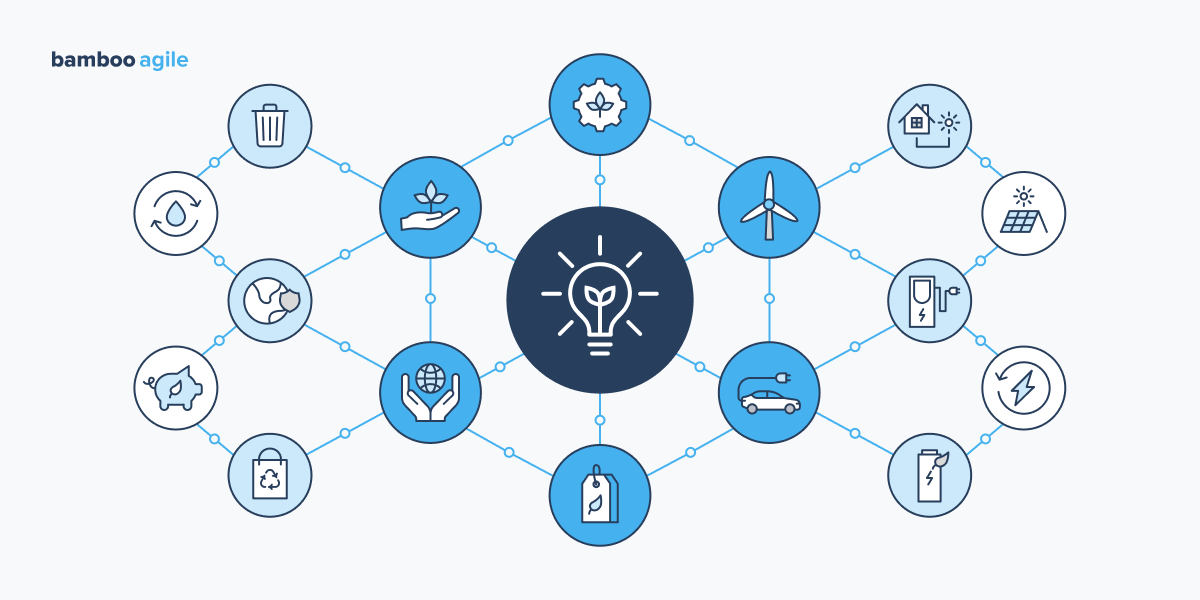Climate change is an immediate threat, not a prospect for the remote future. If you look at the recent realities, you will find that the climate is shifting towards hotter temperatures and we need to take actions to prevent this.
Nevertheless, in this environment, climate technology solutions are arising. The industry’s powerhouses are tackling climate change, from implementing energy efficiency solutions into their operations to refitting their existing facilities for carbon capture.
In this article, Bamboo Agile looks at the most promising climate tech achievements of 2024. Let’s join the green side.
What Is Climate Tech
Climate technology, or climate tech, focuses on finding solutions to address climate change. It covers carbon capture, clean transportation, and renewable energy. Climate tech goals are to reduce the greenhouse gasses and save our planet, all while using sustainable energy solutions.
Climate tech companies are building solutions that help us to move away from fossil fuels and combat the climate crisis. Their products and services help decrease pollution and even clean the air to save us from a changing climate.
Why Is Climate Tech Important
Our planet is heating up. Last year, the median temperature was approximately 1.36°C (or 2.45°F) warmer than in the late 19th-century pre-industrial average. But what is more worrying is that the last ten years have also been the warmest on record. In these conditions, climate tech is as necessary as ever to help us lower carbon emissions and endure the negative effects of climate change.
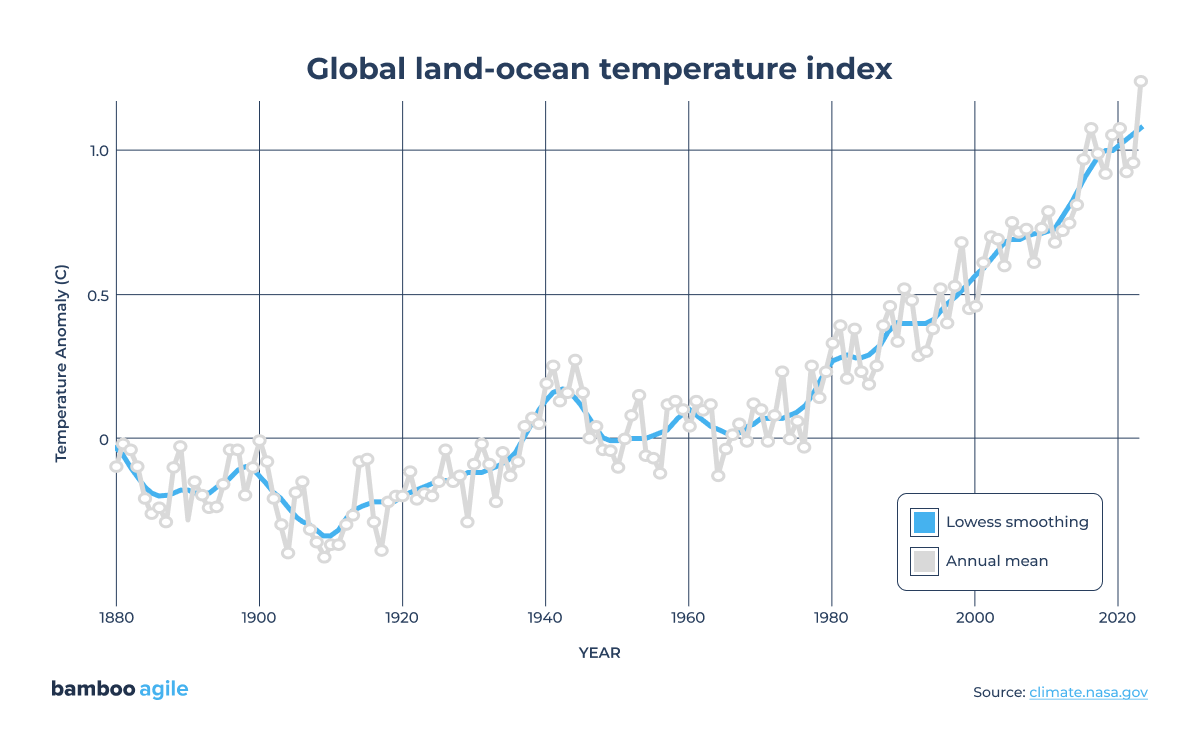
Financially wise, climate tech companies are gaining traction. In 2023, they raised more than $51 billion in venture capital and private equity funding. Even though it is a 12% decline compared to 2022, it is still a smaller part of the overall 35% drop for all startups. Businesses that provide low-carbon energy and transportation solutions received the majority of the money.
But despite the evident importance of climate tech, it requires more than just a novelty idea. Climate tech could only work if it is created in cooperation between multiple institutions and even governments because no single nation can address the crisis on its own.
Yet, if you want to start in climate tech, turning your idea into a solution would be the first step. We advise finding a trustworthy tech partner with expertise in building software for either the energy industry in general or climate tech in particular.
Climate Technology Advancements
Now that you know some basic facts about climate tech, time to look further into its advancements.
Decarbonization
First of all, we need to talk about decarbonization. Generally speaking, it is similar to putting our planet on a diet and helping it get rid of carbon dioxide. At the heart of decarbonization is the reduction of our dependency on fossil fuels and switching to renewable energy sources.
Carbon Capture, Storage, and Removal
If we continue with comparisons, carbon capture, storage, and removal (CCSR) is akin to a climate superhero that captures carbon emissions before they can do any harm. It is a promising technology for decreasing climate change effects. CCRS absorbs carbon dioxide emissions from industrial processes and the atmosphere to stop them from causing even more environmental harm. Once captured, the carbon can be safely stored underground or used for other things, such as boosting oil production or making stronger concrete.

Low-Carbon Manufacturing
Low-carbon manufacturing is the initiative that helps factories reduce their carbon footprint. It includes tools to track and measure carbon emissions and allows manufacturers to understand their impact on the planet and become eco-responsible.
One of the companies that supports the initiative is ExxonMobil. While it still drills for oil and gas, the company boosts spending on its low-carbon solutions unit. It focuses on carbon capture and storage, hydrogen, lower-emission fuels, lithium, and other solutions.
Energy Efficiency Solutions
Energy efficiency solutions are an essential part of decarbonization. Companies introduce such steps as newer, more advanced materials for insulation and smart grids that make the most of energy. They also update heating and cooling systems that can help to use less energy. This has double benefits – not only does it help the planet, but also saves money for businesses and households. For instance, by using smart grid technology, companies can protect themselves from power outages.
An illustrative example of this is Normative’s software for carbon accounting. The Swedish company has built engines that compute supplier emissions precisely by using existing transaction data. The system also indicates emission hotspots and provides action steps for impactful reductions.
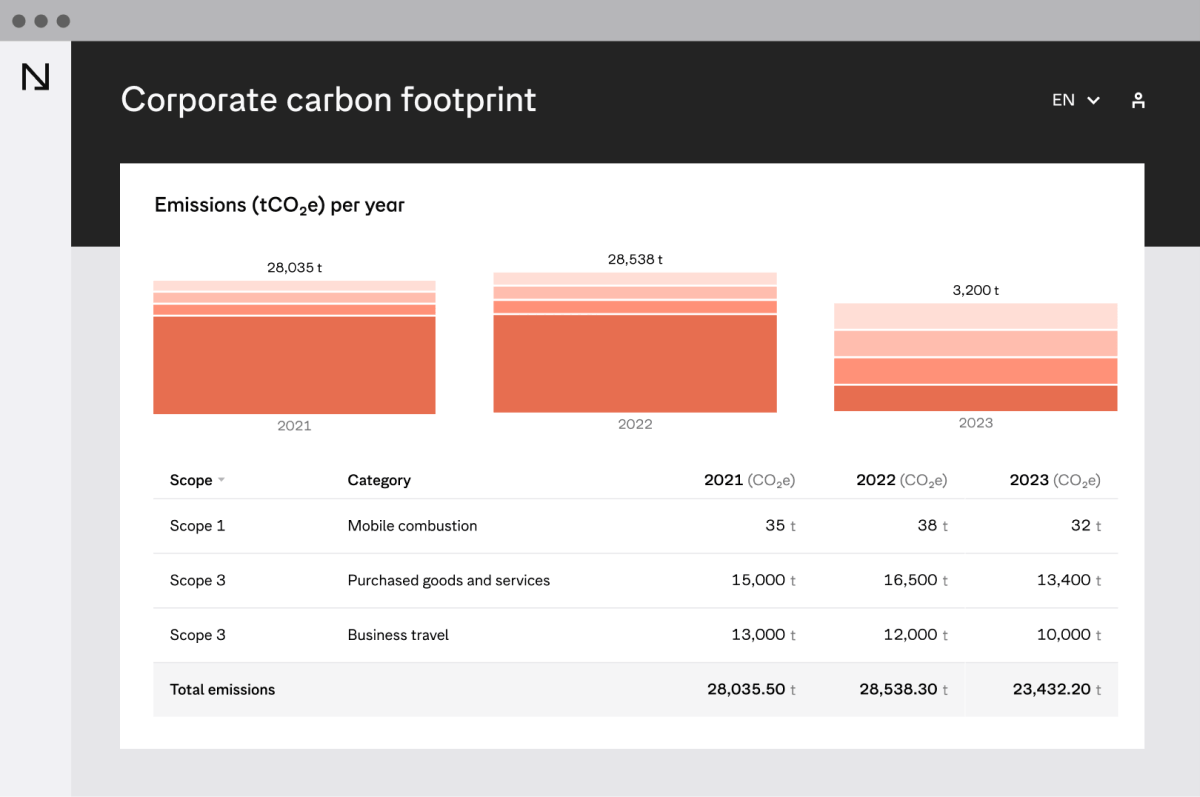
Sustainable Transportation
About one-fourth of greenhouse gas emissions are caused by the transportation industry. Thus, climate tech solutions aim to change that with the introduction of sustainable transportation. Below are the most prominent examples of it.
Electric vehicles
Even though global electric vehicle sales keep growing every year, it might take longer for the worldwide car fleet to become dominantly electric.
Yet, the dynamic is still positive. More people are switching to electric vehicles as battery technology improves, increasing driving ranges. In addition, charging stations have become more common. Our dependency on fossil fuels is decreasing as a result of these developments, which make EVs a viable daily choice.
Shared mobility and autonomous vehicles
The use of ridesharing, or carpooling, is significantly lowering pollution and traffic – the air is clearer when there are fewer cars on the road. And with self-driving cars on the horizon, we can expect even less congestion and better gas mileage.
Hydrogen fuel cells
Hydrogen fuel cells are a technology for vehicles, particularly for bigger ones like trucks and buses. These cars use a chemical process with hydrogen to generate electricity for motors. Vehicles driven by hydrogen produce only water vapor, which makes them an emission-free substitute for conventional internal combustion engines.
Notable examples of hydrogen fuel cell vehicles are Toyota Mirai and Hyundai Nexo.

Source: caranddriver.com
Sustainable Technology
While decarbonization is probably the most well-known area of climate tech, it is far from being the only one. You can find sustainable technologies if you look closely at almost any industry.
In this section, Bamboo Agile highlights some of the more notable instances.
Tech-Driven Reforestation
Deforestation and natural disasters have done incredible harm to this planet. According to the UN Food and Agriculture Organization, deforestation resulted in the loss of about 420 million hectares of forest between 1990 and 2020 – and agriculture is the main culprit.
In this case, reforestation, or the planting of new trees in a forested region that has been destroyed or damaged, is taking root. Climate tech companies use drones and technologies such as seed-tracking software to plant seeds and restore forests.
As an illustration, a Washington-based company Mast Reforestation does exactly that – restores forests destroyed by wildfire using drones and biotechnology. Flash Forest, a company that operates in Canada, also reforests post-wildfire areas with the help of unmanned aerial vehicles, technology, and automation.
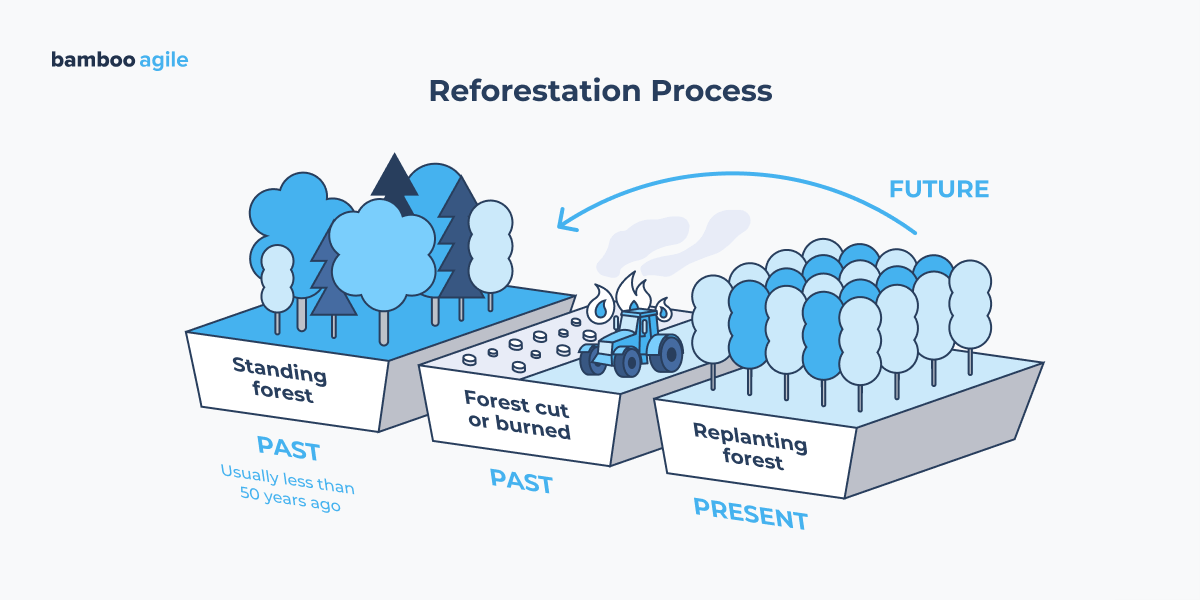
Smart Agriculture
Smart farming, or smart agriculture, is the application of modern technologies and data-oriented farm operations to improve sustainability in agricultural production. This sector relies heavily on the Internet of Things (IoT) and artificial intelligence (AI).
Smart agriculture tech includes precision farming, livestock monitoring, automated irrigation, crop monitoring drones, smart greenhouses, and more. Fossil fuel-powered equipment is less necessary for smart farming, which helps decrease greenhouse gas emissions.
If we look at real-life cases, companies like AMOS Power and Robotic Perception build autonomous machinery for harvesting, weeding, and pruning. Meanwhile, platforms developed by Farms.io and FEEDWARE Systems digitize and facilitate farm operations and crop management.
Overall, smart farming has great promise for delivering a more sustainable, higher-quality agricultural product using environmental monitoring technology.
Sustainable Packaging
People become more eco-conscious, and they demand products that are better for the environment. Packaging is one of such products. Tech companies are responding to this demand by investing in sustainable solutions.
Innovations in sustainable packaging include:
- Biodegradable packaging
- Digital printing
- Packaging automation
- Active packaging
- Custom packaging
- Recyclable packaging
- Edible packaging
- Nanotechnology
- 3D printing.
Big corporations have taken action on this particular trend. The Tetra Laval Group, one of the leading sustainability technology companies, offers services and solutions for the eco production, packaging, and delivery of food.
Modern Enabling Technologies
Technologies that greatly improve an organization’s or user’s capabilities across a range of industries are known as enabling technologies.
In climate tech, there are two prominent technologies that inspire transformation, namely carbon data and analytics and geospatial technology.
Carbon Data and Analytics
Typically, companies conduct a carbon footprint analysis to determine the amount of pollution that their servers and data centers produce. This involves pinpointing the sources of the pollution, figuring out how much electricity their technology consumes, and estimating the amount of greenhouse gasses. Such analysis helps them in identifying the main issues and creating improvement objectives.
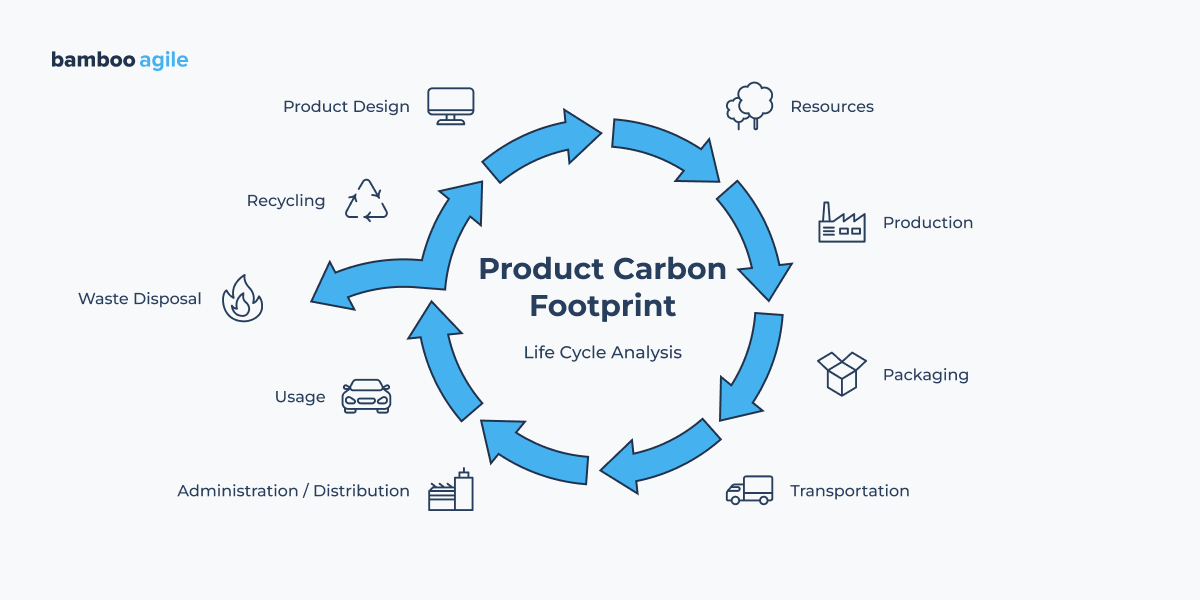
Geospatial Technology
This technology uses satellite imagery to identify environmental conditions and climate changes. For instance, it can be utilized to track deforestation or assess climate policies’ effects. In addition to satellite data, geospatial tech employs geographic information systems (GIS) and remote sensing.
A California-based company Planet Labs is a notable organization that works in geospatial technology. It operates a fleet of satellites to capture hi-res daily images of the Earth and use them to track changes in agriculture, forestry, and urban development.
A Couple Of Success Stories Of Climate Tech Solutions Implementation
As the climate tech trends continue to blow up, companies that fight against climate change gain more popularity. Here are some of the most noteworthy stories.
The Canadian power company SaskPower, or Saskatchewan Power Corporation, refitted one of the boilers at its Boundary Dam Power Station as a carbon capture and storage facility. In 2023, the facility captured 786,539 tonnes of CO2 and was available 85.5% of the time. Over the years, 5,788,253 tonnes of CO2 have been captured and prevented from entering the atmosphere by SaskPower.
In the automotive industry, two companies producing EVs hold top spots by market capitalization – Tesla in the first place and BYD in the third. BYD, or Build Your Dreams, is a Chinese vehicle manufacturer that creates EVs and supplies batteries for other EV makers. In 2022, BYD announced that it had suspended fuel car production and started focusing on electric vehicles only. Since then, the manufacturer’s sales have doubled. In 2022, BYD sold over 1.8 million vehicles, and in 2023, this number was over 3 million.
Some Climate Tech Companies to Watch in 2024
The aforementioned examples have already demonstrated to us that there are myriads of climate tech companies of all sizes. In this section, we look at the most promising climate tech startups that are gaining prominence right now.
Sylvera
Sylvera is a carbon data provider that helps organizations and governments get on track to net zero. The data and insights offered by Sylvera affect carbon project investments. The company’s software automates the evaluation of such projects that capture, remove, or avoid emissions. In 2022, Sylvera raised $32 million in series A funding.
H2 Green Steel
A Swedish company H2 Green Steel produces, as you may have guessed, green steel. Essentially, this means that the company does not use fossil fuels – in this particular case, coal – in the production and replaces it with hydrogen. Such a replacement helps reduce CO2 emissions by 95% compared to traditional steelmaking. H2 Green Steel has secured close to €6.5 billion of financing for its facility in northern Sweden.
Planboo
Another Swedish company on the list is Planboo. It is a nature-based carbon removal company that uses biochar derived from plant waste, including bamboo, to construct verified carbon sinks. A digital Measurement, Reporting, and Verification (dMRV) tool used by the company facilitates remote tracking and auditing of biochar production and application on the ground. In 2024, Planboo completed its most recent round of investment, attracting over $1.1 million in support.
Cylib
Backed by market leaders like Porsche and Bosch, this German startup recycles lithium-ion batteries. The company’s technology can extract components like lithium, cobalt, and graphite from each cell. Currently, Cylib is building a massive facility in Dormagen that will span 236,000 square feet and will have the capacity to recycle 30,000 metric tons of used batteries annually. Earlier this year, Cylib raised investments of €55 million for this purpose.
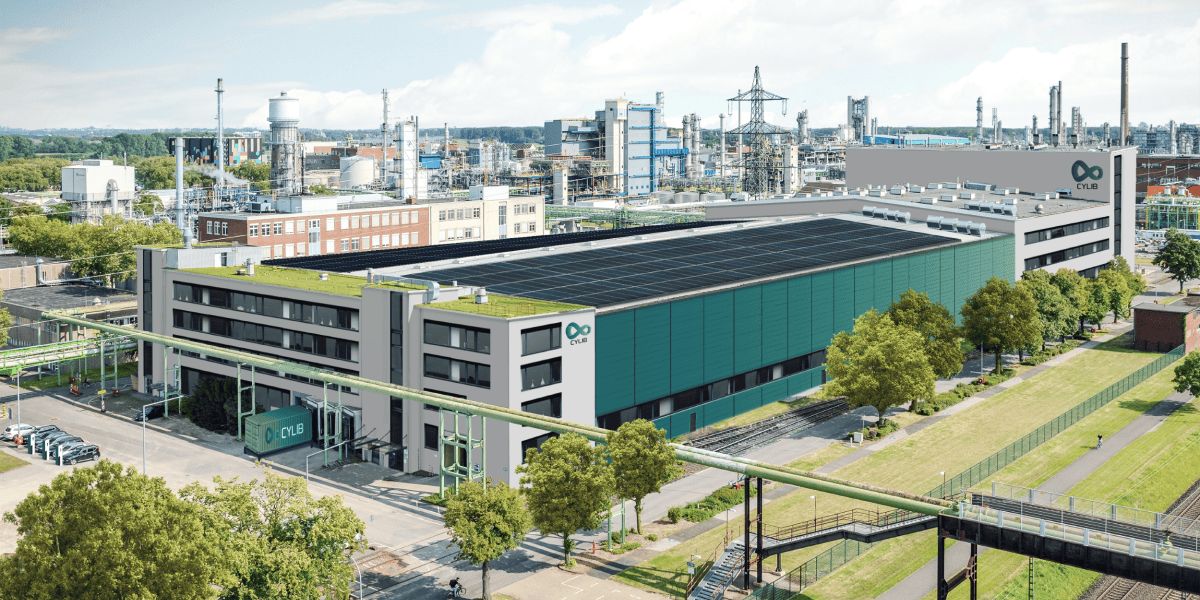
Source: cylib.de
BluSmart
BluSmart is an Indian ride-hailing startup that boasts an all-electric fleet. It maintains around 7,000 EVs. In addition, the company opened multiple charging stations around India. BluSmart has recently announced its expansion into the UAE market, with the further launch of its operations in Dubai with a fleet of Audi e-tron vehicles.
Software Development Support For Climate Tech Startups
Bursting out into the climate tech market requires strong software. At Bamboo Agile, we have more than 20 years of software development expertise that allows us to support even the most intricate tech ideas. Our team works with emerging technologies often used in climate tech, including AI and IoT. If you have an idea for a solution but no development power to support it, contact Bamboo Agile to discuss it. Together, we can create a world powered by zero-carbon technology.
Conclusion
Climate technology solutions are indispensable opportunities in the collective effort to tackle climate change. In recent years, we have seen the emergence of green tech innovations and clean tech startups. From cars that run on clean energy to the production of green steel, these new ideas can help us cut pollution, save energy, and build a better world. And as more companies get on board, green IT solutions will become even more important in stopping climate change. By working together, governments, businesses, and tech experts can make a real difference and create a sustainable future for everyone.
